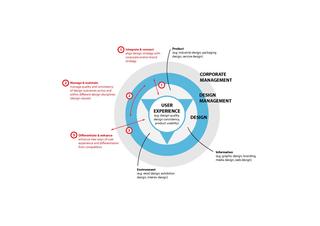Related Research Articles
Marketing research is "the process or set of processes that links the producers, customers, and end users to the marketer through information used to identify and define marketing opportunities and problems; generate, refine, and evaluate marketing actions; monitor marketing performance; and improve understanding of marketing as a process. Marketing research specifies the information required to address these issues, designs the method for collecting information, manages and implements the data collection process, analyzes the results, and communicates the findings and their implications."
Concept testing is the process of using surveys to evaluate consumer acceptance of a new product idea prior to the introduction of a product to the market. It is important not to confuse concept testing with advertising testing, brand testing and packaging testing; as is sometimes done. Concept testing focuses on the basic product idea, without the embellishments and puffery inherent in advertising.
Market research is an organized effort to gather information about target markets or customers. It is a very important component of business strategy. The term is commonly interchanged with marketing research; however, expert practitioners may wish to draw a distinction, in that marketing research is concerned specifically about marketing processes, while market research is concerned specifically with markets.
Qualitative marketing research involves a natural or observational examination of the philosophies that govern consumer behavior. The direction and framework of the research is often revised as new information is gained, allowing the researcher to evaluate issues and subjects in an in-depth manner. The quality of the research produced is heavily dependent on the skills of the researcher and is influenced by researcher bias.

'Conjoint analysis' is a survey-based statistical technique used in market research that helps determine how people value different attributes that make up an individual product or service.

In industry, product lifecycle management (PLM) is the process of managing the entire lifecycle of a product from inception, through engineering design and manufacture, to service and disposal of manufactured products. PLM integrates people, data, processes and business systems and provides a product information backbone for companies and their extended enterprise.
Database marketing is a form of direct marketing using databases of customers or potential customers to generate personalized communications in order to promote a product or service for marketing purposes. The method of communication can be any addressable medium, as in direct marketing.
Decision Analyst is an American marketing research and consulting firm based in Arlington, Texas. It also operates the American Consumer Opinion online panel, which is made up of over eight million people.
The engineering design process is a methodical series of steps that engineers use in creating functional products and processes. The process is highly iterative - parts of the process often need to be repeated many times before another can be entered - though the part(s) that get iterated and the number of such cycles in any given project may vary.
The following outline is provided as an overview of and topical guide to marketing:
Digital marketing is the marketing of products or services using digital technologies, mainly on the Internet, but also including mobile phones, display advertising,and any other digital medium. Digital marketing channels are systems based on the internet that can create, accelerate, and transmit product value from producer to the terminal consumer by digital networks.
Multi-objective optimization is an area of multiple criteria decision making that is concerned with mathematical optimization problems involving more than one objective function to be optimized simultaneously. Multi-objective optimization has been applied in many fields of science, including engineering, economics and logistics where optimal decisions need to be taken in the presence of trade-offs between two or more conflicting objectives. Minimizing cost while maximizing comfort while buying a car, and maximizing performance whilst minimizing fuel consumption and emission of pollutants of a vehicle are examples of multi-objective optimization problems involving two and three objectives, respectively. In practical problems, there can be more than three objectives.
Rule-developing experimentation or RDE is a systematized solution-oriented business process of experimentation that designs, tests, and modifies alternative ideas, packages, products, or services in a disciplined way using experimental design, so that the developer and marketer discover what appeals to the customer, even if the customer can't articulate the need, much less the solution.
Product Planning is the ongoing process of identifying and articulating market requirements that define a product's feature set. Product planning serves as the basis for decisions about price, distribution and promotion. Product planning is the process of creating a product idea and following through on it until the product is introduced to the market. Additionally, a small company must have an exit strategy for its product in case the product does not sell. Product planning entails managing the product throughout its life using various marketing strategies, including product extensions or improvements, increased distribution, price changes and promotions.
A phase-gate process, is a project management technique in which an initiative or project is divided into distinct stages or phases, separated by decision points.
Virtual prototyping is a method in the process of product development. It involves using computer-aided design (CAD), computer-automated design (CAutoD) and computer-aided engineering (CAE) software to validate a design before committing to making a physical prototype. This is done by creating computer generated geometrical shapes (parts) and either combining them into an "assembly" and testing different mechanical motions, fit and function. The assembly or individual parts could be opened in CAE software to simulate the behavior of the product in the real world.
Virtual store research is an extension of the traditional methods of marketing research. While marketing research employs techniques like focus groups, surveys and observation to better understand consumer decision-making, virtual store research uses these standard research techniques within a simulated store setting, delivered via computer. Virtual store research uses 2-dimensional and 3-dimensional computer simulation technology to create retail contexts that are as close to the real shopping experience as possible. This allows test consumers within the virtual environment to interact with store merchandise and make purchase decisions in a way that closely resembles real in-store behavior.

SDI Tools is a set of commercial software add-in tools for Microsoft Excel developed and distributed by Statistical Design Institute, LLC., a privately owned company located in Texas, United States.

In marketing, Bayesian inference allows for decision making and market research evaluation under uncertainty and with limited data.

Goals of a product road map: